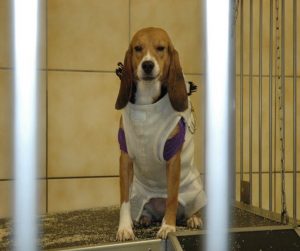Animal rights group lobbies for ‘beagle bill’
By Kelli Duncan For Chronicle Media — July 18, 2016
A beagle wearing a jacket similar to the one used at the University of Illinois in its heart experiments. (Photo courtesy of Beagle Freedom Project)
The animal rights group Beagle Freedom Project is suing the University of Illinois for allegedly misleading the state General Assembly about its animal testing procedures in an attempt to stall a bill that calls for eligible laboratory animals to be made available for adoption once they are no longer needed for testing, according to the group’s vice president.
Beagle Freedom Project is a branch of the Animal Rescue Media & Education (ARME) nonprofit group whose purpose is to rescue and find homes for beagles and other animals used in laboratory research. The BFP does work in 36 different states across eight different countries.
Kevin Chase, vice president of BFP, said that the organization has been trying to pass a bill nicknamed the ‘beagle bill’ alongside Sen. Linda Holmes (D-Aurora) that would require publicly-funded institutions to have an adoption policy in place to try to find homes for eligible lab animals rather than euthanizing them.
Chase said that the bill was named after beagles because they are the most common breed of dogs used in experiments due to their docile nature, but many other types of animals are affected as well.
The BFP’s beagle bill has already been passed successfully in California, Connecticut, Nevada, Minnesota and, most recently, New York.
According to Chase, “The University of Illinois along with the other animal testing laboratories in the state lobbied against the bill and one part of the testimony that they used was that this bill isn’t needed because they’re already adopting every qualified candidate, dog or cat, to homes, which isn’t the case.”
Chase said Lyndon Goodly, director of animal resources at U of I, gave a speech in the fall of last year at the annual conference for the American Association for Laboratory Animal Science encouraging other institutions to fight against external scrutiny of their animal research protocols.
Goodly was unavailable to comment on the BFP’s allegations but university spokeswoman, Robin Kaler, said, “We respond to all FOIA requests in good faith, and the welfare of our animals is a cornerstone of our research work.”
Kaler said that the university could not comment further on the issue as they do not discuss pending litigation.
Holmes said that when the BFP initially brought the bill to her, she had not anticipated that there would be such a strong push back from U of I and other laboratories.
Holmes said that the first thing she did when the bill was proposed to her was to hold a meeting with all of the constituents involved, including representatives from U of I to hear the concerns from both sides in an effort to reach a compromise on the nature of the bill.
Holmes said that she made a considerable amount of changes to the bill to accommodate the concerns of the university, but they still would not support the passing of the bill.
“I was stunned by how strong the opposition was …,” Holmes said. “Basically I heard that it didn’t matter what we did, they hate the Beagle Freedom Project people and they are going to oppose anything that we present and that’s ultimately what happened.”
Holmes said that by the time that they had gotten done making all of the changes demanded by the university and other state animal testing laboratories, the bill simply called for state funded institutions to develop an adoption policy and to make this policy publicly accessible.
The decision of how to determine whether an animal is eligible for adoption or not as well as what the institution’s adoption policy would entail would still be left entirely up to the institution, Holmes said.
U of I currently only allows animals to be adopted by staff/faculty and students, Holmes said, and under the beagle bill they would still be able to do this.
The bill does not require state-funded universities or research institutions to find a home for the animal, it simply asks them to offer leftover animals to a shelter of their choosing and if the shelter is full or cannot take the animals for some reason then the institution is allowed to euthanize them, said Holmes.
Even given these accommodations, U of I and the other state institutions still opposed the bill.
“One of their arguments in committee was that ‘we’re already doing this’ and I said well then if you’re already doing it then this is absolutely no burden upon you. But let’s just make sure that everybody who is receiving public dollars is doing this,” Holmes said. “Their opposition to the bill didn’t really make any sense to me.”
Holmes said that since the beagle bill was unable to make it out of committee, she will have to wait and try to reintroduce the bill in the next session in January. She said that she hopes the university will be more open to compromise then.
Chase said that the controversy started when the BFP filed an open record request under the Freedom of Information Act or FOIA with the university about a year ago to obtain information on individual lab animals in an effort to find candidates for post-experiment adoption.
The university refused to release many of the documents requested claiming that they revealed personal information and trade secrets, among other things, Chase said. He said that the only documents that were released to them were, “heavily redacted.”
The BFP then sought the opinion of Attorney General Lisa Madigan who agreed that the documents should be released to the public. Chase said that the university ignored Madigan’s opinion and still refused to release the rest of the documents.
“The public has a right to know how its tax dollars are spent at these schools and our nonprofit seeks to identify potential post-research candidates for adoption,” said Ryan Gordon, counsel for Beagle Freedom Project, in a press release. “The University of Illinois’ fear of transparency is undemocratic and truly a death sentence for the victims of their experiments.”
Chase said the documents that the BFP did receive from the FOIA request suggested that the university was euthanizing laboratory animals unnecessarily instead of allowing them to be adopted.
“One such document revealed to us that they were calling for the beagles to be euthanized in the course of the research if they wouldn’t cooperate while being put into restraining jackets because of their fear,” Chase said.
Chase said that this largely contradicted what the University told the press and state legislature about the nature of their experiments and their post-experimentation adoption protocols during their testimony in front of the Senate Higher Education Committee on April 27 of this year. Chase also testified in front of the committee on behalf of the BFP.
Chase said that the university’s testimony during this meeting showed that they were not only obstructing evidence but purposefully misleading state legislature as well so the BFP decided that a lawsuit was necessary.
According to a press release given by the organization, the BFP filed a petition for injunctive relief against the university with the First Judicial Court District Court in Cook County on June 27. The university did not release a response to the lawsuit being filed, Chase said.
— Animal rights group lobbies for ‘beagle bill’ —








